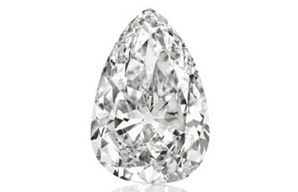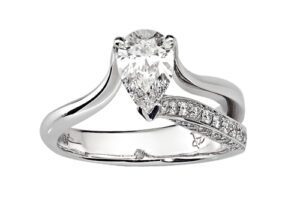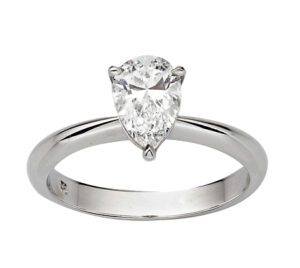Pear shape diamonds is also called the “tear drop diamond” because of its shape. The pear shaped diamond is a combination of the round brilliant cut diamonds and the marquise diamond.
The pear shaped diamond is a fiery cut, with lots of wonderful sparkle and flash. The elegant lines of the pear shaped diamond lend a sophisticated air to both the simplest and most elaborate of ring settings.

Choosing a Pear Shaped Diamond
When purchasing pear shape diamonds, it’s extremely important to pay attention to quality and to select the highest grade cut you can afford. Pear shape diamonds are prone to two cutting issues: the bow tie effect and the “high” or “uneven” shoulders.
Visit our diamond search to find the perfect pear shape.

Uneven Shoulders
The non-pointed end of the pear shaped diamond should have a nice round and gentle arc. In addition to “uneven shoulders”, sometimes cutters, to increase carat weight of the diamond, “square off” giving a “rounded triangle” end to the pear shaped diamond. High shoulders and uneven shoulders decrease the value of the diamond and should be avoided. The good news is that both of these potential problems are visible to the naked eye.
Visit the official GIA website for in depth analysis of cut.

Pear Shaped Diamond Rings
Whenever choosing a non-traditional diamond shape, it’s always good to ensure that the recipient will be as enamoured with the shape as the giver is, as it is a very unique cut and does not suit everyone’s taste.

How to Wear a Pear Shaped Diamond Ring
Which way should the diamond point face when wearing the ring? Should the point of the teardrop face the wearer’s finger nails or wrist?
The answer is either. There is no standard right or wrong answer. Many wearers feel that the ring pointing towards the fingernails provides a slimming look for the fingers. At the end of the day it really comes down to wearer’s choice.
Pear shaped diamonds require specialised settings – particularly with added claws to protect the point of the diamond. A six claw setting consists of – five claws supporting the bulk of the diamond and the sixth claw protects the fragile point of the pear shape diamond.
Quick Quote:

